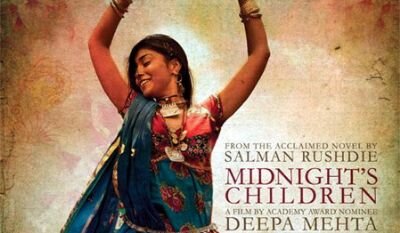
|
| |
| |
|
|
| |
|
|
| |
Midnight's Children
(12A§)
© Unknown - all rights reserved
|
| |
|
|
| |
 |
| Tookey's Rating |
|
|
1 /10
|
| |
| Average Rating |
|
|
4.67 /10
|
| |
| Starring |
| Satya Bhabha, Siddharth Narayan, Rajat Kapoor |
| Full Cast > |
|
|
|
| |
Directed by: Deepa Mehta 
Written by: Deepa Mehta, Salman Rushdie  based on his novel based on his novel
|
|
| |
|
|
| Tookey's Review |
|
| Pro Reviews |
|
| Mixed Reviews |
|
| Anti Reviews |
|
| Cast |
|
| |
 |
| |
| Released: |
2012 |
| |
|
| Genre: |
DRAMA
FANTASY
EPIC
|
| |
|
| Origin: |
UK |
| |
|
| Colour: |
C |
| |
|
| Length: |
148 |
|
| |
|
| |
|
|
| |
|
|
Rushdie’s folly.
|
Reviewed by Chris Tookey
|
Would that I could sing the praises of Midnight’s Children, adapted by Salman Rushdie from his own Booker prize-winning novel and narrated by him.
As Life of Pi proves, magic realism can be made to work in the cinema.
Rushdie’s book creates a fantasy world where children born in the hour after Indian Independence have special powers, like less entertaining X-men. Regrettably, the film utterly fails to persuade us that this is true, or that the conceit tells us anything worthwhile about Indian history.
Rushdie’s characters come across as puppets, and the plot is a series of clumsy authorial contrivances. Rushdie never seems to know which parts of his story are important and which aren’t.
Seemingly at random, Rushdie’s intrusive voice-over lectures us and violates the first rule of cinema: show, don’t tell.
The tone is all over the place: from light and whimsical to ponderously bombastic and condescending. “There are certain ironies that must not pass unnoticed,” Rushdie intones at one point, just in case we’ve missed anything.
The political content is blatantly simplistic. By painting the complex figure of Indira Gandhi as a pantomime villain, it is Rushdie rather than she who comes across as nasty and narrow-minded.
It’s all horribly strenuous and embarrassing, like an adman attempting to impersonate Borges, and directed with plodding literalism by the ill-named Deepa Mehta. This is a vanity project that inadvertently destroys the reputation of the original work. It is no wonder that the most fulsome praise on the poster comes from Mr Rushdie himself.
|
|
|
|
|
|
